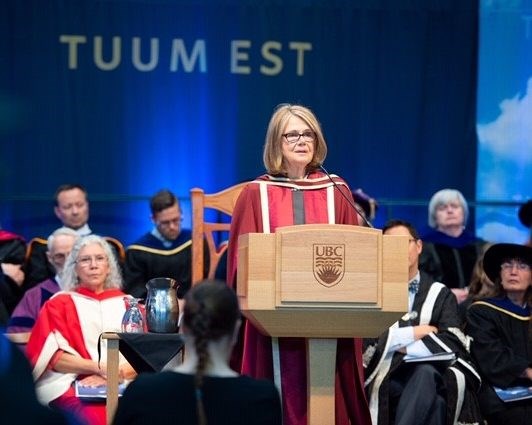In December 2002, the British Columbia Progress Board first submitted a report to the provincial government, recognizing the need to expand post-secondary learning in the Okanagan.
Three years later, UBC Okanagan in Kelowna welcomed its first students.
As UBCO Deputy Vice Chancellor and Principal Deborah Buszard tells The Orca, it has become one of Canada’s fastest-growing post-secondary institutions, offering a full menu of undergraduate and graduate programs.

Bob Price: I’ll begin with the same question I asked UNBC President Daniel Weeks: What makes you most proud?
Principal Buszard: Certainly the fact that we were founded in partnership with the Okanagan Nation is highly notable. That has been foundational to our work on Aboriginal access and success at UBCO.
I’m also extremely proud of our regional economic impact, which is currently around $2 billion annually. Our growth has been phenomenal, from about 3,000 students in 2005 to just under 11,000 today – and [in that same time period] from doing around $6 million in research to $25 million last year. The reality is we are creating a truly great university by world standards.
Bob Price: What do you attribute your growth to?
Principal Buszard: I think people have become aware you can come to the Okanagan and get a UBC degree in a beautiful part of the world with one of Canada’s best climates. We offer an education in everything from medicine to engineering to fine arts, teaching and nursing.
About 25% of our students are from the Southern Interior, which is about the same as when we first opened. Most of our students come from away, and 20% of our students are international.
Bob Price: Is being connected to UBC a major advantage for you?
Principal Buszard: It is a great brand. It is certainly helpful to us to grow our programming to be part of a very large enterprise because that gives us a lot of backroom capacity. For example, a student here has access to the whole of UBC’s library and other great research libraries in the world even though you are on a relatively small campus. So being a part of a big university does have some advantages.
Bob Price: What about challenges?
Principal Buszard: Our biggest challenge is space. Space for students, classrooms, and research because our growth is happening so quickly. We can’t build buildings quick enough. For example, right now we are forced to use modular or portable classrooms to meet immediate needs.
Bob Price: You mentioned that 20% of UBCO students are foreign. Where are they coming from?
Principal Buszard: A hundred different countries. Typically, the largest number of those students are coming from China and India. We have students from all over the world including the United States, Europe, South America, and many African countries. One of the things that makes a great university is to be international and globally connected.
Bob Price: Is there a friendly competition among universities such as Kamloops and Kelowna?
Principal Buszard: I don’t believe we compete. I think we are more complementary.
For example, when they created the Okanagan campus of UBC, they also spun off Okanagan College. People were thinking that perhaps Okanagan College and UBCO would be competing. However, what has happened is many of our programs articulate; so a student can start at Okanagan College and complete their degree at the university. So there is more collaboration than competition.
Bob Price: As you know, there is much discussion about the cost of attending university. Should a post-secondary education be free?
Principal Buszard: I’ll tell you my perfect university. Every student would have a full-ride scholarship. Every professor and administrator is paid what they think they are worth.
Bob Price: So it probably won’t happen?
Principal Buszard: Exactly. What would we like the government not to be doing so it could provide a full freight for all students? It’s not a feasible option, and like many things in Canada, I think we have found a compromise. As you likely know, a domestic student’s post-secondary education is heavily subsidized by government. We also have very good support programs to help students in need. I know for a fact that in systems where there are no fees, access to university is much less than we have in Canada.
Next week, a conversation with Dr. Brett Fairbairn, President and Vice Chancellor of Thompson Rivers University in Kamloops.
As always, I welcome your comments and criticism on Twitter @kammornanchor and email [email protected].
Bob Price is a veteran B.C. broadcaster who anchored the morning news on CHNL radio in Kamloops for the past 30 years. Bob is also a past Webster Award winner whose previous stops included Vancouver and Calgary.
SWIM ON:
- Read part one of the series, an interview with UNBC's Dr. Daniel Weeks.
- UBCO isn't the only institution growing in the Central Okanagan - Bob Price on Kelowna International Airport.
- What do students do between semesters? Roslyn Kunin writes in praise of summer jobs.


